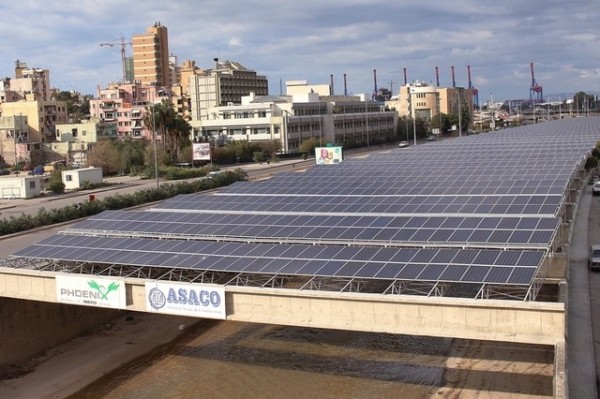
By: Josh Wood
The exasperated sighs and muttered curses as entire neighborhoods are plunged into darkness; hours spent fiddling with generator fuse boxes; the fear of being trapped in an elevator during a blackout – these are experiences all Lebanese share.
Lebanon simply does not generate enough electricity to keep the lights on. Daily power outages affect every corner of the country – at least three hours even in well-to-do quarters of Beirut, and much longer in other areas.
After decades of living with power interruptions, many here have accepted that things will not change. But the recent development of renewable energy offers a glimmer of hope.
Lebanon’s first solar farm will soon be connected to ailing power grid, and government policies favouring the development of renewable energy resources have spurred a small boom in the industry.
Renewable energy alone will not solve the electricity shortages, but it is seen as a good first step in a country where political gridlock and corruption have hobbled development of the energy sector. The local mentality is that “nothing works in Lebanon”, but now, “what was considered unachievable is being achieved”, said Simon Gerges, line manager at Phoenix Energy, a Lebanese renewable energy firm.
Along a 300 metre-stretch of the Beirut River, shiny photovoltaic panels are suspended on steel frames over the shallow, polluted waterway.
This is the first phase of the government-funded Beirut River Solar Snake (BRSS) project, which is set to provide one megawatt of electricity to the power grid starting in April.
When completed, the plant will generate 10MW – enough energy to power 10,000 homes. No timeline for the project’s completion has yet been announced.
Phoenix Energy and Asaco, another Lebanese private renewable energy company, worked with the ministry of energy’s Lebanese Center for Energy Conservation (LCEC) on the US$3.1 million (Dh11.4m) project.
The electricity generated will be only a tiny fraction of what Lebanon needs, but those behind it say its visibility will encourage both the public and private sector to develop renewable energy.
“The purpose of the project is not to produce energy only, but to be a showcase for the public,” said Ramzi Abu Said, president of the Lebanese Solar Energy Society and managing director of Asaco.
The project has already raised interest in renewable energy nationwide, said Pierre El Khoury, the head of the LCEC.
He credits the project with spurring private companies to install solar power equipment capable of producing 30MW since it was announced in 2013 and expects the private sector to add an additional 50MW of power this year.
“This is the real role and impact of BRSS,” he said.
While companies are investing in solar energy to end their reliance on the erratic power grid and expensive generators, there are currently no provisions for electricity generated by private entities to be sold to the national grid. They can only use it for themselves and so far, their use of solar energy has already slightly reduced the strain on Lebanon’s overtaxed system.
In 2009, the Lebanese government committed to generating 12 per cent of the country’s total energy supply from renewable sources by 2020.
Mr El Khoury said Lebanon solar energy could add between 200MW and 250MW of generation capacity in the next five years, and wind energy had an even higher potential and could add 300MW.
If current proposal to build three wind farms in the north of the country go through, “in one year we can jump from zero megawatts of wind energy to 150 or 160,” Mr El Khoury said.
There is also room for growth in hydroelectricity, but experts say new dams could be too costly and could face environmental concerns. Instead, those pushing for green energy in Lebanon encourage the repairs and upgrade of the country’s existing hydroelectric dams.
Private sector investment in renewable energy has been helped by attractive government-backed financing. Lebanon’s central bank offers interest-free loans for renewable energy projects that can be repaid over 14 years.
This puts solar energy within reach for both businesses and families wanting to break free from government-supplied electricity and the expensive “generator mafia” that keeps the lights on during power cuts.
Owners of generators often charge residents exhorbitant prices to plug into their grids when government power is not available. In some areas of the country where corruption is rife, power supplies are deliberately disrupted by these “generator mafia”.
In the past two years, about 70 homes have become fully solar-powered, said Mr El Khoury.
Costs ranging from $10,000 to $35,000 for most homes and the soft loans make this an attractive option.
But obstacles remain. In cities, most people live in apartments and few have roof space needed for solar panels. And there is still not much awareness about renewable energy in the country.
“Now people look at the river as they pass by and they ask what the purpose of the system is,” said Mr Gerges of Phoenix Energy. “There are so many people right now asking ‘what do these panels do?’”
Despite the optimism over renewable energy resources, solving Lebanon’s electricity problem remains a challenge.
The country’s power plants produce only 1,500MW of electricity while demand is at 2,500MW.
Demand has surged with the arrival of an estimated 1.5 million Syrian refugees. The power plants continue to rely on imported fossil fuels and the state-owned electricity company is mired in debt. Already stretched, the country’s electricity grid is easily affected by damage from winter storms and armed clashes.
For some, the solution to the power woes were available several years ago when the country prepared to tap offshore natural gas reserves. But amid the political bickering among lawmakers, that resource remains trapped beneath the seabed.
“Lebanon has many critical problems in energy beyond renewable energy – renewable energy is only a supportive action for the big crisis,” said Mr Abu Said. “The solution, unfortunately, is not with renewable energy.”
The National

Leave a Reply
You must be logged in to post a comment.